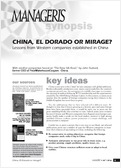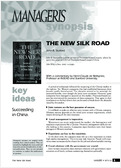Chinese thought and corporate strategy

The principles behind the thinking of classic Chinese strategists turn out to be surprisingly relevant for coping with today's corporate strategy issues.
The limitations of traditional Western strategic thinking are becoming sharply apparent in today’s world. After all, how can you apply rational logic to analyze a world that appears to have lost all rhyme or reason? How can you plan your next move when everything is changing at a disconcerting pace? How can you fight competitors when you don’t even clearly know who they are?
In such a context, Chinese thinking opens up some interesting perspectives. Contrary to the Greeks, whose philosophy shaped most Western thinking, the ancient Chinese believed that the world could not be ordered and controlled with rational concepts and clear-cut models. They considered that all is changing and ephemeral. The Chinese sage, and particularly the strategist, would say that we must not attempt to control change in the world. Instead, we must adapt to circumstances and try to take advantage of the perpetual flow of our environment. Isn't this similar to the issues now facing corporate executives ?
The books that we have selected underline the applicability of some classical Chinese principles to contemporary corporate strategy, three of which appear to be particularly relevant:
– Learn to think in terms of “vital links.” Work to strengthen the links between your company and its environment and to weaken those of your adversaries.
– Adopt a dynamic vision of strategy: fundamental trends are often more significant than particular events.
– Resist the appeal of spectacular moves. The most effective strategic initiatives are those that influence a situation at little cost and without excessive risk.
SubscriberSign in
to download
the synopse (8 p.)
VisitorI want to buy
this synopsis (8 p.)
VisitorI want
to subscribe
See also

China, El Dorado or mirage?
China seems to have everything to attract foreign investors, but the pitfalls are numerous. What lessons can be learned from the experiences of Western companies that have already gained a foothold in the Middle Kingdom?


![Comprendre et appliquer Sun Tzu [Understanding and Applying Sun Tzu]](images/ouvrages/l/2377.jpg)

![Le manager joueur de go [The Go-Playing Manager]](images/ouvrages/l/2379.jpg)